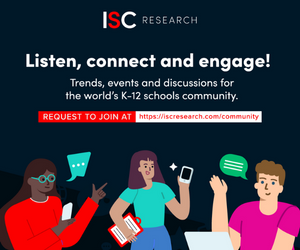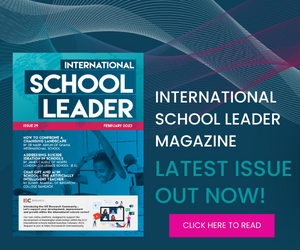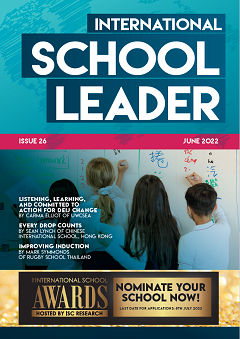By Fiona Carter
For the third year in a row, Wellington College China has received HR Asia’s Best companies to work for award and is the only education company to receive this honour. It stems from a strategic priority for the group to be the employer of choice in the region – both foreign and local. Is this a duty or a choice for all of us as leaders in the international school sector?
A need and a responsibility
Many governments now ask for evidence of how any new international school will upskill the local workforce ahead of any application for a regional licence to operate and, in my opinion, rightly so. The golden thread of an excellent school is consistency of standards and we know that local academic and non-academic teams give this stability.
As is often quoted, ‘we are our people’, and as the number one asset, investing in local employees’ success and cultivating their talent to the same extent as those from overseas is essential in inspiring a truly collaborative and respectful culture between an internationally branded school and the country in which it is based.
Mentoring local nationals to achieve positions of leadership is crucial to influence long-lasting improvements to the educational landscape with genuine knowledge and experience of that country, its heritage and societal norms. And, of course, foreign staff members also benefit. Training in pedagogical approaches is so often based on what we, as international educators, think is the ‘right way’, but it is good and sometimes transformational in terms of attitudes to challenge these assumptions from curriculum review to financial and facilities systems.
At Wellington International, we have seen increasingly worthwhile benefits beyond the obvious one of easier recruitment in terms of work visa and residency as something which is very much two-way. Through identifying high potential teachers and non-academic team members from the country in which the school is situated, we have managed to secure an ever-growing pipeline of future school leaders. Hopefully, as the world reopens, locals from China for instance, will consider possible secondments to one of our schools in another country. As well as sharing excellent practice, it makes a founding team so much stronger and helps to retain employees of the highest calibre.
What works?
Any programme needs to be reviewed in terms of it accessibility and suitability for local versus foreign nationals – everything from language of debate in the training itself, to when it is delivered in the day and how inclusive it is to staff across different functions. For instance, many teachers and teaching assistants (TAs) may participate in after school clubs and so do not have the luxury of being able to join a CPD session straight after school ends. Local, non-academic function teams might be able to access training more readily in the school holidays, but this needs to be considered if the training is delivered by a foreign lead who usually travels at this time.
Our recent review of suitability of external qualifications for local teachers raised the question of IPGCE and Qualified Teacher Status (QTS) and whether this type of accreditation is necessary for all and the best route to follow. Internationally recognised awards such as these must certainly be part of any suite we offer but if a locally recognised qualification gives more options, then this should be researched, noting that they are often less expensive and potentially more relevant in terms of national compliance and parent preferences.
Targeting the development of local employees allows for a strategy in school to be much more successful where language or knowledge of the local context is critical. In our international school in Shanghai, the Dual Language programme is expanding, and who better to deliver this than highly skilled Chinese, bilingual teachers? However, many have not been trained to have an understanding of constructivist pedagogy or project-based teaching approaches. Hence, the bilingual teacher programme has been launched to do exactly this, alongside appointing a small number of interns from Fudan and East Normal Universities who will, in turn, become trainee teachers. The overall aim is to upskill their primary-age phase teaching knowledge and move away from teaching Chinese as specialist subject.
Key aspects of delivery are the development of a core unit through a combination of face-to-face teaching, discussion, Q&A, guided self-study tasks and class-based activities. Recognising the value of the role of local TAs is a whole separate article but incremental pathways are crucial in showing how they are valued and that the world really can be their oyster, or, at least, within our own family of schools.
Developing local leaders
Leadership programmes have been an essential part of addressing the imbalance of local versus foreign employees in academic functions in particular. Many of our foreign leads have experienced accountability inspections such as OFSTED and KHDA, but these are new to many local leaders in South East Asia and can prevent them from being as confident as they could be when they experience our Annual Reviews. Therefore, a multi-tiered programme has been designed for our schools in collaboration with Wellington College to look at these aspects of articulating quality in their school or department with greater ease and accuracy.
Rolling out the opportunity for aspiring and established local leads to gain National Professional Qualification for Middle Leaders (NPQML) qualifications will be pivotal in retention as well as enabling local staff to work in other parts of the world. The impact so far is that a third of all successful QTS applications are local nationals, almost 100% of newly appointed teachers in our Early Years departments are from the TA programme and, in Wellington China, almost 50% of those who have studied the National Professional Qualification for Senior Leadership (NPQSL) and for Leading Teaching (NPQLT) are Chinese.
This attitude towards a specific strategy for upskilling all levels of employee via in-house and externally accredited means will be extended to our new school in India where there is already a plethora of highly regarded professional networks of which we need to play a significant role.
Top tips:
- Start by actively looking for potential and providing clear pathways which are sufficiently differentiated to support and include all.
- Language of delivery of any PD to a recognition and understanding of equivalent, local qualifications are important.
- Go the extra mile for local employees and set KPIs for leaders to identify any barriers which exist and find solutions from external providers if needed.
- When preparing a whole school or department initiative, ensure that local nationals are key members of the implementation team. These are the ambassadors of the future success of any project as their retention translates into successful and sustainable impact on teaching, learning and parent partnerships.
- For any culture of innovation and improvement in offering upskilling opportunities to the local community, Human Resources must be at the heart of any strategy and follow through to make sure pathways are clear to follow, equitable and take advantage of the exceptional local talent by which our schools are surrounded.

Fiona Carter is Director of Education at Wellington College International. Connect with Fiona directly on LinkedIn




